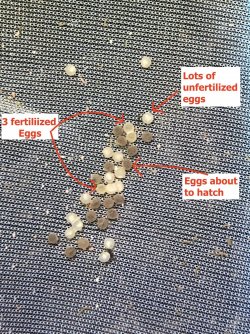EmilyS
New Member
I have one female and three male Peppered Corydoras that have been laying eggs like crazy, but I've had very inconsistent success. I always remove the eggs by rolling them off the glass with my finger so they stick to my finger, and then rolling them onto the side of another container.
The first batch I collected had been laid 8-12 hours before. About half were fertilized and about half of those hatched, giving me four fry. The second batch was similar with about 70% fertilized and and all but one hatching, giving me 6 fry. This gave me some confidence.
But the next time, I saw the cories breeding in the morning and began pulling the eggs off the glass as soon as they were laid. I collected about 110 eggs. All but 5 got a white yolk within 24 hours and the last 5 I finally tossed after seeing no change 8 days after they were laid. I thought perhaps they got temperature shocked because I was putting them in a smaller container that, though it started out the same temperature as the tank, may have cooled over the hour or two that they were laying eggs.
It was at this point that I got a breeder box for the 6 fry I still had (4 of the smaller ones had died while my sister was caring for them, perhaps due to bad food). The next batch of eggs was small, only 21 eggs. I put these in the breeder box with the older fish. They were originally stuck to the side of the box but the older fish knocked them to the bottom where they constantly moved them around. 19 were fertilized. These eggs took a four hour trip in the car in the breeder box with no heater, and I lost only one. The remaining eggs are hatching today.
Yesterday, I collected 103 eggs in exactly the same way as last time and this morning all but 3 have a white yolk. The older catfish only knocked ~20 eggs down this time.
Any idea why I have such inconsistent success? Do I need to wait a little while before collecting eggs? Is it possible to squish eggs without actually breaking them? Do the eggs need to be kept moving with a tumbler? And why have I had wildly different success rates using exactly the same methods?

The first batch I collected had been laid 8-12 hours before. About half were fertilized and about half of those hatched, giving me four fry. The second batch was similar with about 70% fertilized and and all but one hatching, giving me 6 fry. This gave me some confidence.
But the next time, I saw the cories breeding in the morning and began pulling the eggs off the glass as soon as they were laid. I collected about 110 eggs. All but 5 got a white yolk within 24 hours and the last 5 I finally tossed after seeing no change 8 days after they were laid. I thought perhaps they got temperature shocked because I was putting them in a smaller container that, though it started out the same temperature as the tank, may have cooled over the hour or two that they were laying eggs.
It was at this point that I got a breeder box for the 6 fry I still had (4 of the smaller ones had died while my sister was caring for them, perhaps due to bad food). The next batch of eggs was small, only 21 eggs. I put these in the breeder box with the older fish. They were originally stuck to the side of the box but the older fish knocked them to the bottom where they constantly moved them around. 19 were fertilized. These eggs took a four hour trip in the car in the breeder box with no heater, and I lost only one. The remaining eggs are hatching today.
Yesterday, I collected 103 eggs in exactly the same way as last time and this morning all but 3 have a white yolk. The older catfish only knocked ~20 eggs down this time.
Any idea why I have such inconsistent success? Do I need to wait a little while before collecting eggs? Is it possible to squish eggs without actually breaking them? Do the eggs need to be kept moving with a tumbler? And why have I had wildly different success rates using exactly the same methods?

